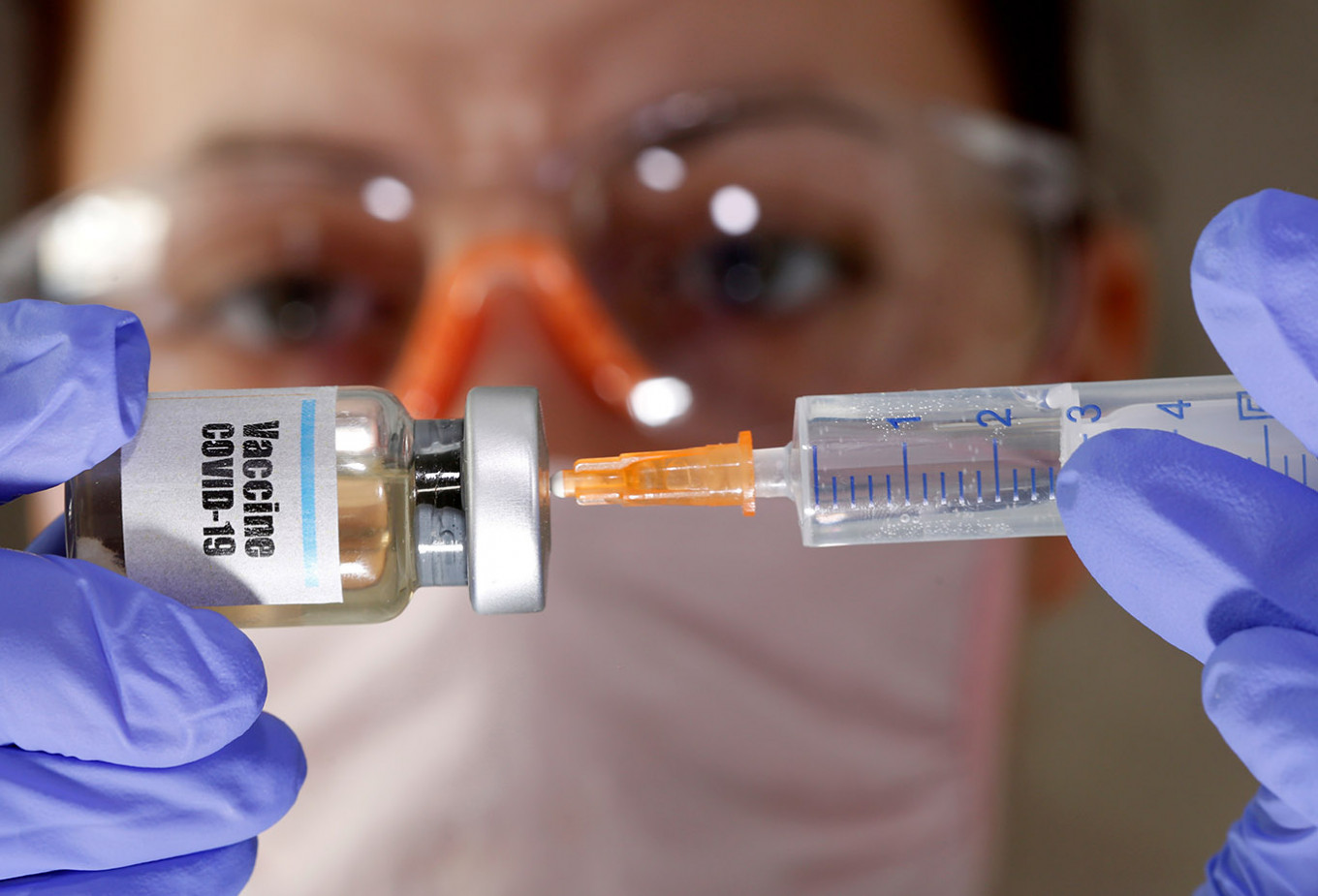Popular Reads
Top Results
Can't find what you're looking for?
View all search resultsPopular Reads
Top Results
Can't find what you're looking for?
View all search resultsIndonesian COVID-19 vaccines to undergo strict human, animal testing
Change text size
Gift Premium Articles
to Anyone
I
ndonesian researchers and authorities have assured that COVID-19 vaccine testing on animals and humans will meet ethical standards and undergo strict procedures, as animal rights organizations have objected to animal testing in formulating the vaccine.
Indonesia is trying to fast-track the local development of a COVID-19 vaccine. It has established a consortium involving, among others, state-owned pharmaceutical company PT Bio Farma and the Eijkman Institute for Molecular Biology, which has finished the first complete genome sequence of coronavirus samples from Indonesia in early May, as part of the initial stage of vaccine development.
Indonesian Food and Drug Monitoring Agency (BPOM) head Penny K. Lukito said researchers must clearly and objectively explain their research to their human subjects, who would have to give consent before continuing the trials. The vaccine prototypes also have to go through animal trials to prevent adverse effects in humans and assure the vaccine’s safety and effectiveness.
A 2015 BPOM regulation on clinical trial procedures also requires the study sponsors to report any “serious” adverse effects no later than seven days after reports of life-threatening experiments, in addition to progress reports every six months, she said.
“Those who violate these provisions may be subject to administrative sanctions in the form of a warning, suspension, or the cessation of clinical trials,” Penny told The Jakarta Post in a statement on Saturday.
Read also: Indonesia targets local COVID-19 strain in Eijkman-led 2022 vaccine initiative
The BPOM will evaluate the protocols for clinical trials to verify whether the labs have fulfilled Good Clinical Practice (GCP) principles and get more information on the potential vaccines. If researchers meet all the requirements, the agency will then issue permits to start the human clinical trials.
Eijkman Institute director Amin Soebandrio said animal testing was to ensure that the vaccine’s antigens could form antibodies in humans, which could help protect them from COVID-19.
“We have to ensure that vaccines fulfill ethical requirements. At a minimum, it could be proven beneficial [...] and pose no danger or as little danger as possible to the subject,” he said, adding that the vaccines would also need to secure halal certification from the Indonesian Ulema Council (MUI).
He said while human testing would have stricter standards than that of animals, such as a higher sterility level during the vaccine production, the COVID-19 health emergency may call for fewer numbers of human trials and shorter time for clinical testing, without sacrificing the vaccine’s safety and quality.
Read also: Indonesia calls on countries to uphold social responsibility regarding COVID-19 vaccines
Animal rights organizations have voiced their objections to animal testing despite researchers ensuring that they will adhere to ethical norms.
Jakarta Animal Aid Network (JAAN) founder Karin Franken said it was “ridiculous” to artificially induce different species in situations that they would never normally contract the virus, keep them in an “unnatural and stressful” environment, and try to apply the results of experiments on animals to human beings.
This was because physiological reactions to drugs “vary enormously" from species to species, she said. Animals in labs typically displayed behaviors indicating extreme psychological distress, she added, warning against possible invalid data produced from stressed lab animals.
“So, all these poor animals are suffering for nothing," Karin said.
In 2018, the People for the Ethical Treatment of Animals (PETA) published findings showing that 95 percent of pharmaceutical drugs that were tested safe and effective in animals failed in human clinical trials during experiments at the United States’ medical research agency the National Institute of Health (NIH).
University of Indonesia (UI) health law researcher Djarot Dimas Achmad Andaru said, however, animal testing was not prohibited by ethical norms. Instead, the United Nations' Convention Against Torture and the UN Universal Declaration of Human Rights only forbid human trials that are inflicting “greater pain" or unnecessary damage as well as those carried out without consent.
Read also: Eijkman Institute finishes sequencing Indonesian coronavirus strain
Bio Farma’s R&D project integration manager Neni Nurainy said researchers would prioritize the use of rats and house mice before using long-tailed macaques, also known as crab-eating macaques -- primates native to Southeast Asia and not considered an endangered species in Indonesia.
In the short term, Bio Farma is working with Sinovac Biotech, China’s leading coronavirus vaccine developer, which has started mid-stage human trials for its candidate vaccine, to obtain the formulation, technology and active ingredients for a potential COVID-19 vaccine, she said. Bio Farma is also creating another vaccine from scratch with the Eijkman Institute.
Read also: Bio Farma to start pre-clinical trial for COVID-19 vaccine in 2021
Neni has said that it expects to start a pre-clinical trial for its vaccine with the Eijkman Institute next year, with a seed vaccine being pushed back to February 2021 from what was initially the end of 2020. The company also aims to commercialize its vaccine with Sinovac Biotech in the first quarter of 2021.
Indonesia needs to secure a minimum of 340 million ampoules of COVID-19 vaccine to accommodate at least 170 million people -- nearly two-thirds of the country's total population -- in the archipelago, Coordinating Economic Minister Airlangga Hartanto has said.
There are still no proven vaccines or antiviral drugs to treat COVID-19, with most patients only receiving palliative care. The World Health Organization (WHO) has listed 136 vaccines that are being developed worldwide as of June 9, with 10 already undergoing clinical trials.










